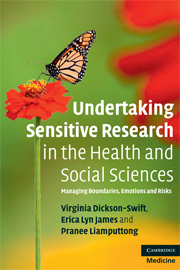 Undertaking Sensitive Research in the Health and Social Sciences
Undertaking Sensitive Research in the Health and Social Sciences Book contents
- Frontmatter
- Contents
- Preface
- Acknowledgements
- About the authors
- 1 What is sensitive research?
- 2 Doing sensitive research: methodological, theoretical, ethical and moral perspectives
- 3 Conducting a sensitive research project
- 4 Managing boundaries in sensitive research
- 5 Emotions and sensitive research
- 6 Managing risks and ethics in research
- 7 Implications and recommendations for researchers
- References
- Index
- References
5 - Emotions and sensitive research
Published online by Cambridge University Press: 11 September 2009
- Frontmatter
- Contents
- Preface
- Acknowledgements
- About the authors
- 1 What is sensitive research?
- 2 Doing sensitive research: methodological, theoretical, ethical and moral perspectives
- 3 Conducting a sensitive research project
- 4 Managing boundaries in sensitive research
- 5 Emotions and sensitive research
- 6 Managing risks and ethics in research
- 7 Implications and recommendations for researchers
- References
- Index
- References
Summary
It has become increasingly fashionable for individual researchers to ‘personalise’ their accounts of fieldwork. But there has been little systematic attempt to reflect upon their experiences and emotions that are reported in any overarching collective or epistemological sense.
(Coffey, 1999:1)There is a growing awareness that undertaking qualitative research on sensitive topics is an embodied experience and that researchers may be emotionally affected by the work that they do; however, empirical attention to the emotional nature of research is lacking. In this chapter we provide a number of different conceptualizations of emotions and examine their relevance for research work on sensitive topics. In order to understand the emotional nature of qualitative research on sensitive topics we also examine the sociological literature pertinent to emotion work and explore how the theories of emotional labour and emotion work can be applied to the experience of undertaking sensitive research.
As we have outlined in earlier chapters, undertaking qualitative research on sensitive topics requires interaction with people in order to understand and document their experiences. To do this we need to acknowledge that ‘Qualitative social research is ‘people work’ and is therefore also ‘emotional work’ ’ (Lee-Treweek, 2000:128). Liz Stoler (2002:270) reminds us that ‘emotional reactions and personal needs do not just vanish because one has declared oneself a researcher’. Acknowledging and documenting the emotion work required from researchers to do this type of research may help us to understand some of the difficulties they face.
- Type
- Chapter
- Information
- Undertaking Sensitive Research in the Health and Social SciencesManaging Boundaries, Emotions and Risks, pp. 73 - 94Publisher: Cambridge University PressPrint publication year: 2008


